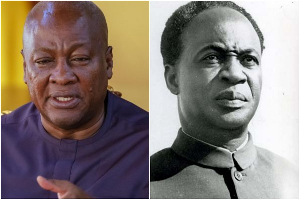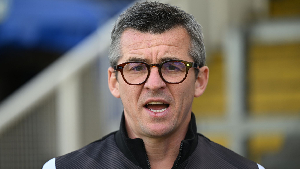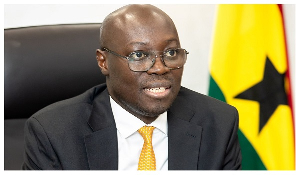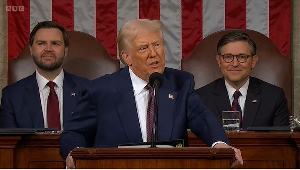Mary Morgan goes paragliding with Walter Neser, the energetic South African expert behind the annual Kwahu event
This is perhaps the most unusual interview I have ever conducted: suspended in a harness some 600 metres or so above the matchbox-sized houses and ant-sized cars of Nkowkow in the Eastern Region, Walter Neser, a paragliding “legend” according to his colleagues on the ground, tells me about the history of this Easter sporting event.
Walter is 35; he has been paragliding for some 18 years in countries around the world; he has recently been organising the Paragliding World Championships in South Africa; his home country; other recent trips include Australia, Israel. Even so, this spot in the mountains of Kwahu is amongst the best places he has found to fly, he says: the combination of thermals which now has us pushing ever further up into the clouds, trying to break through to the sun above, and the breathtaking views across the forests, the mountains, even to the Volta Lake in the East, is quite unique.
“Ghana has very good weather for paragliding. The conditions here are really good at certain times of the year of course, and it’s very easy, very calm – you can just stay up in the air as long as you want. There’s no turbulence, it’s great to fly with the vultures and the scenery is really great.”
I am surprised to report that he was right: calmness, tranquility, an unusual quiet, was what I found, even as we floated away from the mountain and toward the tiny tro-tro station far below. There was no traffic and noise from here, and beyond the initial stomach-in-my-mouth fear on the run way, the initial plunge into the open air and the worry of the wind not filling the canopy on time, the feeling of flying was really quite a relaxing one – I wasn’t scared at all, in the hands of this world expert.
“No where else in the world do you have the same atmosphere, the excitement from the Ghanaians watching the flight,” says Walter. “It’s something so new and unique to them, that they really get very excited.”
A few clever tricks and a whole hour later, we drop down into the landing field – the grassy stadium of Nkowkow, some 2.4km from the take-off strip on the mountain. The mob of children who swamp me as I dizzily find my feet proves the excitement Walter had described. It’s not every day that these miraculous flying machines keep dropping people down into the middle of their football game!
But perhaps they should get used to it, because the Pepsi-Ferdinand Ayim Hang and Paragliding Festival is now in its third year, a new staple on the events menu which already has visitors flocking to th e street carnivals and colourful parties of Kwahuland for the Easter weekend. Indeed, the event has been growing year by year, and there are even plans to make the location a paragliding location year-round, not just at Easter, says Walter, who is encouraging paragliding instructors and schools to make use of the spot when weather conditions are poor elsewhere.
Our feet now firmly on the ground, cold beers in hand after a hard day’s flying – I was Walter’s fourth and final passenger of the day – we settle down for a slightly more conventional discussion about the event.
In 2004, Jake Obetsebi-Lamptey, the Tourism Minister, had approached Walter about the site, with the belief that it could be a first-rate paragliding location. At around the same time, Walter had also spotted the mountain on a drive from Accra to Kumasi, he says, his keen eye for a good fly wondering at its potential.
“I came up here, had a look, and it looked really good for it. We met again and decided how we would go ahead with the idea – and came up with the festival.” An area of the mountainside needed to be cleared to make a runway, and some of Walter’s paragliding friends needed to be brought on board – it takes 30-40 paragliding lessons before one can obtain a paragliding license, and there are currently no qualified paragliders, or paragliding kits, in Ghana.
This year, his team of experts comprises 17 pilots from around the world – South Africa, the US, UK, France and Switzerland – up from 12 in 2006. For the first time this year, the group also includes a couple of base-jumpers, who will jump from Khawu ridge with parachutes.
The vast majority of the pilots and jumpers are amateur enthusiasts, who take time off work to fly and to tandem fly with others, and who needed to be persuaded that Ghana was worth the vacation time.
“I knew we could pull it off; I didn’t have any doubt,” says Walter. “However, it was difficult to convince other people for the first festival to come here, and the people who came were people who knew me – so they knew what they were getting into, they came here because they trusted me. The people who didn’t know me were like, ‘Who are you and what the hell is going on in Ghana?’”
Whilst Walter worked to persuade flying professionals to take up the challenge, the challenge of organising and marketing the festival itself was taken up by the Tourism Minister as well as former District Chief Executive, Raymond Safo-Gyan, the Ghana Tourist Board and others. Ferdinand Ayim, the former Special Assistant to the Minister of Tourism, who was tragically killed in a motoring accident on his way to the site on April 6 last year, was one of the most energetic brains behind the event, and this year’s festival was dedicated to him.
“When we had the first festival it was much more exciting and went a lot better than I had expected,” says Walter. “When I had first checked out the site, it was during the Harmattan, so the visibility was worse. I could tell that Kwahu was good for flying, but I didn’t realise quite how good it was until the festival began.”
The growing tourism industry and infrastructure in Ghana, and its reputation as a stable country within West Africa, has also been an important part of the festival’s success, and even since Walter has been visiting Ghana, he has noticed an increase in hotels and visitor facilities.
“Looking into the future now, we are trying to find ways to make it more sustainable, because currently it’s costing a lot to have the pilots here, so we’ve got to find ways to get past that.”
The challenge now is to make the festival more self-sustaining, however. Currently, the comparatively low cost of flights - ¢500,000 compared to up to $200 in the US – means that all the experts are heavily subsidised by the event organisers. For next year’s event, Walter plans to lure more fully-paying hang and paragliders to the festival, by offering those pilots coming to fly tandem passengers the opportunity to come for free if they can bring five others with them.
Meanwhile, the word amongst the paragliding community is spreading, he says – people are beginning to talk about Ghana as a destination. Marinas Brenkman is another South African pilot, who rates Walter as a “hero” in the sport. This is his first year at the Kwahu paragliding festival; at the end of the first day, he raves about the location. “So far, I am really impressed – so long as the weather remains consistent.”
For Marinas and for others, Kwahu is definitely a spot they will be recommending to friends. “I think people will come because they know they can come to Ghana safely,” he says. “Ghana is exotic, it is politically stable – and it is different.
“One thing I love about paragliding is that it takes me places.”
Entertainment of Wednesday, 11 April 2007
Source: --

















